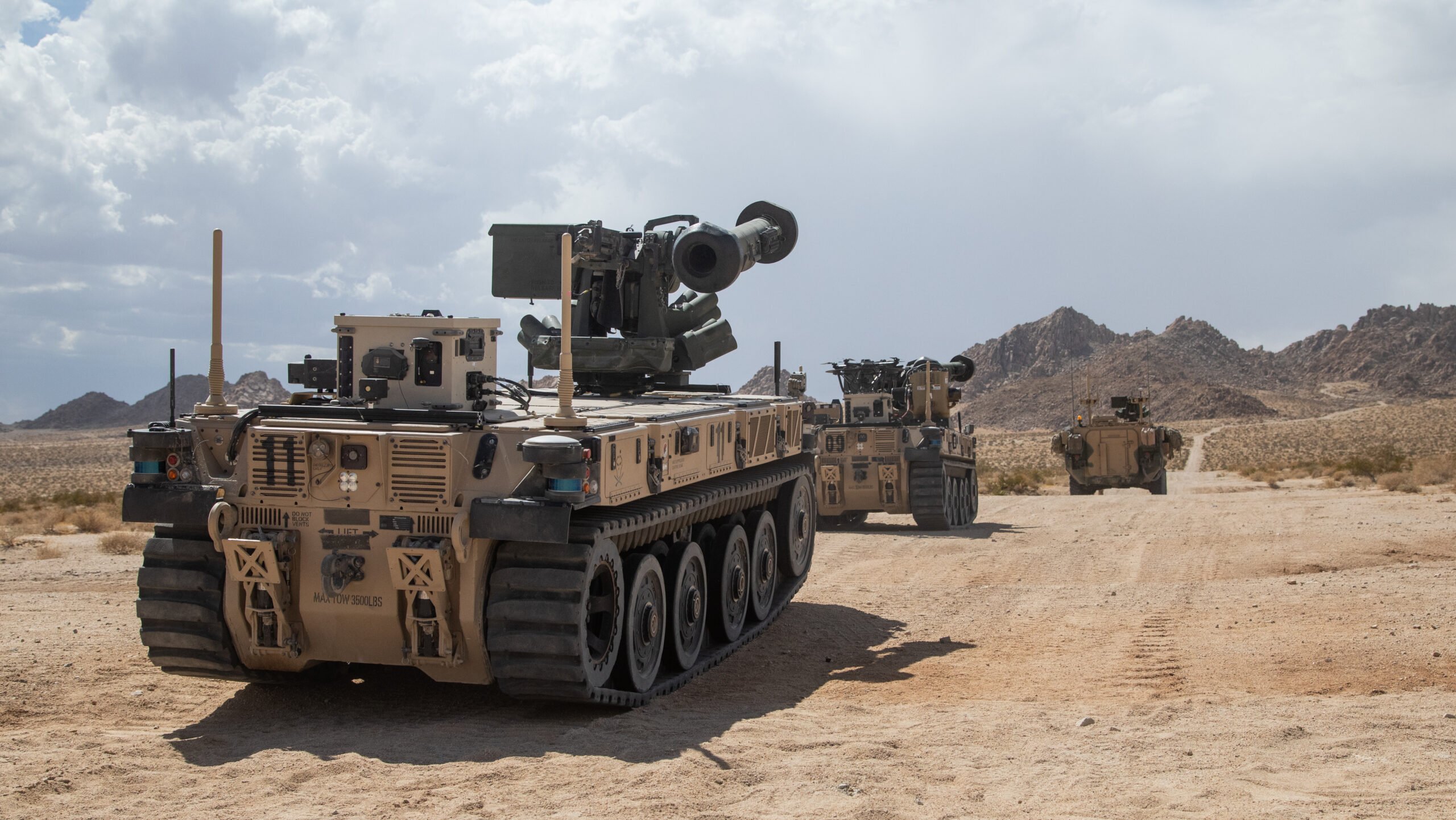
A Robotic Combat Vehicle-Light prototype used during soldier experimentation at the National Training Center at Fort Irwin, Calif in 2023. (Savannah Baldwin/US Army)
WASHINGTON — The Army hasn’t announced which company will build its Robotic Combat Vehicle (RCV), but has now selected eight companies to prototype autonomous software and processes to get that future fleet moving and fighting on the battlefield.
“We are excited to work with these best-in-class autonomy providers, software experts, and systems integrators as we drive towards merging software capabilities developed through the RCV software acquisition pathway (SWP) into the RCV full system prototype,” RCV Product Manager Steve Herrick said in a press release today.
Herrick’s Army team is saddled up with the Defense Innovation Unit (DIU) on that Ground Vehicle Autonomous Pathways (GVAP) project, and after posting two solicitations and receiving 110 responses, the duo whittled the vendor field down and grouped them into three areas — autonomous navigation, machine learning and autonomy, and software system integrators.
Four companies (Forterra, Kodiak Robotics, Neya Systems and Overland AI) have landed deals for that autonomous navigation pipeline, while two companies (Applied Intuition and Scale AI) will square off for the machine learning and autonomy piece, and two more (Anduril and Palantir) will compete to be the software system integrator.
“Together, these companies will support the … (RCV) program in developing a robust, capable, and compliant software system that can operate in a variety of autonomous modes and rapidly integrate a variety of payloads as they become available,” DIU added.
Additional details about the contract award values, future evaluation processes and final downselect timelines were not disclosed today.
The service has been eyeing ways to field autonomous combat vehicles for decades and even moved out on a plan to acquire three categories: an RCV-Light, -Medium, and -Heavy. But after experimenting with the light and medium prototypes, it altered plans and decided to first focus on developing a smaller vehicle and separate the hardware piece (the combat vehicle) from the software/ autonomy piece.
“You have [software defined] technology cycles, the refresh cycles, that are far outpacing our buying models. … We have to, in many ways, find a new way to get after that subset of capabilities differently,” Army undersecretary Gabe Camarillo said today at an Association of the US Army breakfast.
As the service does just that with the RCV software piece, it has also scrapped all three size categories, at least for now. Maj. Gen. Glenn Dean, the service’s Program Executive Officer for Ground Combat Systems, told Breaking Defense in December 2023 that while the word “Light” is still attached to ongoing RCV work, it is in name only and the service needed to “file it off.”
“Practically speaking, from a capability standpoint, there really isn’t a light,” he said at the time. “It is an RCV that has mission payloads and the original sort of light and medium and heavy concepts are now morphing …to be more about modular mission payloads and … the mission role defines the payload.”
As for the actual vehicle portion of that competition, Breaking Defense previously reported that the RCVs should be smaller than 224 x 88 x 94 inches, weigh less than 10 tons, and be transportable by rotary wing aircraft. A single platform should also be capable of defeating light- to medium-armored threats and include lethal capacities such as self-defense systems, anti-tank guided missiles or recoilless weapons.
Four companies are currently vying to produce such a vehicle for the Army — McQ, Textron Systems, General Dynamics Land Systems and Oshkosh Defense — after the Army awarded them with a combined total of $24.7 million for the first phase of the project last year. They are each tasked with delivering two RCVs to the service by August for mobility testing and soldier touchpoints. Findings from those events will then be used to select a single company to proceed with Phase II in fiscal 2025, and the winner will be tasked with finalizing designs and delivering up to nine prototypes by FY26, the Army said last year.
Robotic moves: Army picks 8 tech companies to compete Robotic Combat Vehicle pieces - Breaking Defense
Read More
Bagikan Berita Ini

















0 Response to "Robotic moves: Army picks 8 tech companies to compete Robotic Combat Vehicle pieces - Breaking Defense"
Post a Comment